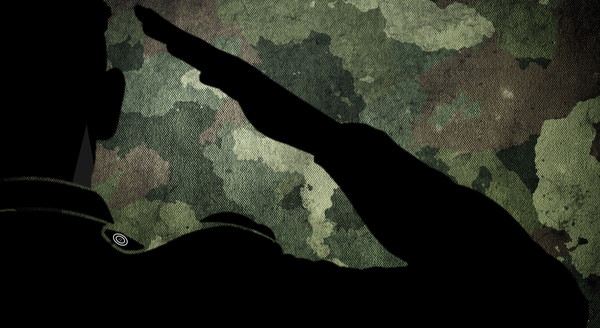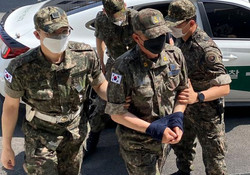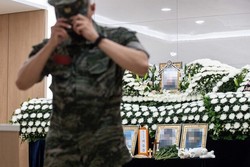
The issue of sex crimes in the military has long been a serious social problem, and although various measures and manuals have been prepared for it, it still regularly occurs. In 2021, the media reported three victims who took their own lives due to sexual offenses in the military. This incident caused the outrage of many people. On April 15th, the Act on the Appointment of Independent Prosecutor passed the plenary session of the National Assembly to investigate the truth about the death of Lee Ye-ram air force sergeant first class. However, in order to eradicate the issue of sex crimes in the military, it seems that the government will need to make continuous efforts and come up with countermeasures even after the Act is enforced. Let's take a closer look at the issue of sex crimes in the military.
Sex Crimes in the Military
Frequent Sex Crimes in the Military

The issue of sex crimes in the military has been a problem for quite a long time. In 2013, an army captain refused to have a sexual relationship with her superior and committed suicide leaving a note saying, “I am an officer in this country where honor is important.” Two years later, in 2015, the military announced the “Comprehensive Measures for the Eradication of Sexual Violence” and made efforts such as establishing the Ministry of National Defense’s Gender Equality Committee in 2018, but the issue of sexual violence in the military still frequently occurs. According to “Sex Crimes in the Last 5 Years” submitted by the military to the office of Kim Min-ki, the Democratic Party of Korea, there were a total of 1,874 cases of sexual offenses committed by soldiers in the Army, Navy, and Air Force between 2017 and 2021. Specifically, 751 cases (40.07%) were committed by ‘executives’, which includes generals, officers, non-commissioned officers, and other military personnel. 1,123 cases (59.93%) were committed by the enlisted soldiers. Of these, 1,868 cases (99.68%) were from male perpetrators, and 6 (0.32%) were from female perpetrators. If so, are these frequent sexual offenses being dealt with in accordance with fair procedures? According to the “2019 Military Human Rights Situation Survey” announced by the National Human Rights Commission of Korea in 2021, the positive responses to the question “Are grievances related to sexual harassment and violence handled in the unit according to a fair procedure?” decreased from 75.8% in 2012 to 48.9% in 2019. In response, the National Human Rights Commission of Korea reported that “in the process of handling sexual violence grievances, fairness was damaged, post-treatment was insufficient, and there is a possibility that secondary damage occurred.” Eventually, even if a sex crime occurs in the military, it is highly likely that the military tried to cover up the case, or the victims gave up on their attempts to solve the problem by making the case known.
Sex Crimes Led to Death
In 2021, three victims who took their own lives as a result of multiple, repeated, sexual offenses in the military were reported in the media, causing a huge stir. In May 2021, at the 8th Fighter Wing of the Republic of Korea Air Force (ROKAF) and 20th Fighter Wing of ROKAF, and in August, the 2nd Fleet of the Republic of Korea Navy (ROKN), the victims were driven to death. Victim A, a female noncommissioned officer of the 8th Fighter Wing of ROKAF, was repeatedly molested by warrant officer B, who was her superior, from March to April 2021. Afterward, when victim A did not go to work and contact was not made, B went to A's dormitory, ripped out the security window, found A's body, and then conducted actions that correspond to the destruction of evidence, such as searching the dormitory. However, the 8th Fighter Wing military police did not reflect the facts related to forced sexual assault in the investigation results at all. It only came to the conclusion that "it is presumed that A died due to excessive work due to system instability, life in the military more restricted and controlled than civilians due to COVID-19, and anxiety over the uncertainty of position change."

20th Fighter Wing of ROKAF, Sergeant first class C made an extreme choice due to sexual crimes in May last year. A dinner ban was imposed to prevent the spread of COVID-19, but Sergeant C had no choice but to attend a dinner due to the pressure of her superior D on March 2nd. Afterward, in the car on the way home, Sergeant C was sexually harassed by D. The next day, on the 3rd, Sergeant C formally reported the crime of sexual harassment and requested a transfer, but C was persuaded and pressured by other superiors to dismiss the case. On the 22nd, Sergeant C reported a second assault to the commander of the information and communications battalion of the 20th Fighter Wing of ROKAF, but two months later, on May 22nd, C was found dead in her husband's residence, who had served in the same unit. The bereaved family claimed that C was sexually assaulted three times in the past year. It was said that before she was sexually assaulted by superior D, she had been molested twice more by other superiors.
Finally, E, a female sergeant of the 2nd Fleet of ROKN, received unwanted physical contact from her superior saying “I will take a look at your palms.” She reported the damage immediately after the incident and formally reported it two months later, but was found dead in her dormitory three days after. E did not make a formal report immediately after the incident, but instead reported it later, so suspicions of secondary persecution such as repression were also raised. After, it has been revealed that there has been secondary persecution, such as excluding the victim's work.
Act on the Appointment of Independent Prosecutor
After Lee Ye-ram (victim C mentioned above) air force sergeant first class’s death, during the investigation of sexual assault cases, the concealment of sexual assault cases within the military, the inappropriate investigation of these offences by the military, and the secondary perpetrators were revealed, drawing considerable public outrage. In the end, on April 15th, 2022, the “Act on Appointment of Independent Prosecutor to Investigate the Truth of Sexual Violence and Secondary Damage in the Military Related to the Death of Sergeant Lee Ye-ram of the 20th Fighter Wing of ROKAF” passed the plenary session of the National Assembly unanimously. In this case, the independent prosecutor system is a system introduced when the fairness of the investigation itself cannot be expected. There are no restrictions on the subject and the scope of the investigation. According to the Act, two candidates for the independent prosecution will be elected by the head of the Supreme Court of Korea and the president of the Korean Bar Association from among those who have served as judges, prosecutors, and lawyers for more than 15 years. After the negotiating group recommends two persons from among those elected, the president ultimately appoints one as the independent prosecutor. “Illegal acts such as sexual assault and secondary damage in ROKAF related to death, including sexual assault cases and illegal acts related to sergeant Lee”, “Misconduct, abuse of power, and related illegal acts such as concealment, appeasing, and conciliation within the Ministry of National Defense and ROKAF Headquarters”, and “related incidents recognized during the investigation” have been determined as subjects of investigation by the independent prosecutor. The independent prosecutor must conduct an investigation for 70 days after undergoing a 20-day preparation period to perform his or her duties, and decide whether to file a prosecution. The investigation period can be extended by 30 days only once.
We Should Eradicate Sex Crimes in the Military
Inducing Changes in the Military Culture
In order to eradicate the issue of sex crimes in the military, it is necessary to find the root cause and prepare countermeasures along with the Act. The Act is only dealing with sex crimes that have already occurred, and other measures are needed to prevent future sex crimes. First of all, sex crimes within the military occur due to the military's unique aspect of being a closed off culture, where access from outsiders is restricted. This is because it is easy to condone and cover up sexual crimes and often leads to a light judgment defending against a person belonging to the same organization. For this purpose, the military human rights ombudsman system has been suggested. The ombudsman system is an administrative control system developed in northern European countries such as Sweden, and refers to a kind of administrative inspectorate with the meaning of “representative, attorney, tribune.” The military human rights ombudsman is a check-in body established separately from the military, which has the authority to conduct a unit investigation, access, and data submission. The introduction of the military human rights ombudsman system will allow the private sector to monitor the human rights situation in the barracks at any time and with no restrictions. This means that the barracks would be open to those in the private sector. The introduction of the military human rights ombudsman system has been discussed for several years. On October 8th, 2015, Rep. Jin Sung-joon of the New Politics Alliance for Democracy at the time said, “Through the establishment of a military ombudsman outside the military, we will overcome the closedness of our military and further encourage our soldiers to become citizens in uniform who are helpful to the country and society. We urge the Ministry of National Defense to change its forward-looking stance.” However, the Ministry of National Defense rejected the suggestion citing concerns that it would infringe on military command and military security. Nonetheless, the military's uniquely closed culture needs to be improved. The government needs to improve the barracks culture in a human rights-friendly direction in consideration of policies such as the introduction of the military human rights ombudsman system.
Strengthening Punishment and Reorganizing the Military Justice System
Another point mentioned to solve the problem of sexual violence in the military is that punishment should be strengthened. Many criticize that even if a sexual offense occurs, it is not eradicated because it only receives a light punishment. In fact, on June 4th, 2021, according to the statistics presented by the Ministry of National Defense, among the 4,936 cases of sexual offenses indicted as military criminal cases from 2015 to June 2020, only 2,173 cases (44%) were prosecuted at all. Even if they were prosecuted, the rate of imprisonment based on the first trial sentence was only 10.3% for the Army, 10.5% for the Navy, and 9.4% for the Air Force, which was only 1 out of 10 cases. In order to solve this problem, first of all, the principle of zero tolerance for sex offenders must be thoroughly implemented. If someone commits or covers up a sexual offense, he/she should bear the responsibility and be dismissed with the punishment. In fact, in 2018, the Ministry of National Defense introduced the “one-strike-out system” in order to eradicate sexual violence in the military, stating that even if a person commits a sexual offense only once, strong disciplinary action will be taken. However, since its introduction, the system has not been functioning properly and is poorly known.

For this reason, voices were raised that the military justice system should be reformed. In Korea, cases of sex crimes in the military were handled under the system of having military courts have jurisdiction over all military trials. In addition, since general officers and commanders were able to participate in military trials, there was a deeply rooted culture of covering up for its members and giving only light punishment. Although the argument for reforming the military judicial system was constantly raised and there were actually movements for reform, the Ministry of National Defense said, “In terms of expertise in overall military life, speed of investigation, effective relief, protection of military security, and guarantee of command, it is desirable to set up within the military” and has repeatedly refused to reform the military judicial system. However, as the issue of sex crimes in the military continued to occur and caused a great social impact, on August 31st, 2021, the amendment to the Military Court Act was passed through the plenary session of the National Assembly. Accordingly, the jurisdiction over sex crimes, crimes that caused the death of a soldier or military officer, and crimes committed by a soldier or military officer before they acquired their soldier status were transferred from the existing military court to the civilian court. The High Military Court was abolished, and the appeal was transferred to the Seoul High Court, a civilian court. In addition, the judge system and jurisdictive officer system, which were the basis for general officers and commanders to participate in military trials, were abolished. This amendment to the Military Court Act is soon to go into effect on July 1st, and as a result of long-standing efforts, there is interest in whether it will have a positive effect on the eradication of sex crimes in the military.
However, voices are still being expressed that this amendment to the Military Court Act is insufficient. Although the High Military Court was completely abolished, it failed to abolish all of the military courts. For this reason, there is also criticism that this amendment to the Military Court Act is only a “half reform.” Many argue that the military court itself should be abolished. According to the Segye Ilbo on September 7th, 2021, in a joint statement, the MINBYUN-Lawyers for a Democratic Society stated, “Statistically, there is no reason to keep the military court during peacetime because crimes that require security in the trial process, such as crimes related to military secrets or crimes of rebellion, account for only a small portion of all military crimes.” In addition, Han Sang-hee, a professor of Konkuk Law School, has asserted that “the only direction in which our military justice system should go is the abolition of the military court during peacetime.” In fact, France, Japan, Sweden, and Taiwan do not operate military courts at all. Accordingly, there is also an insistence that Korea should move on to the abolition of military courts by following the example of other countries that do not operate military courts.
The issue of sex crimes in the military has long been controversial and several measures have been implemented to resolve it, but this was insufficient to prevent the death of Lee Ye-ram ROKAF sergeant first class in 2021. As the Act passed the National Assembly, senior spokeswoman Lee Dong-young of the Justice Party said, “I hope that the Act passed today will serve as an apology for politics that failed to fulfill their responsibilities to the deceased and numerous victims of military sexual violence.” It is true that the Act passed the plenary session to bring the truth into account of the deaths. However, it is urgent to prepare various measures to eradicate the issue of sex crimes in the military in the future. The government should consider the introduction of the military human rights ombudsman system and constantly monitor to ensure that the amendment to the Military Court Act is safely implemented, and to contribute to the eradication of sexual crimes in the military. Can sexual crimes in the military be completely eradicated? Although the answer is still unclear, we must do our best to make it possible.

